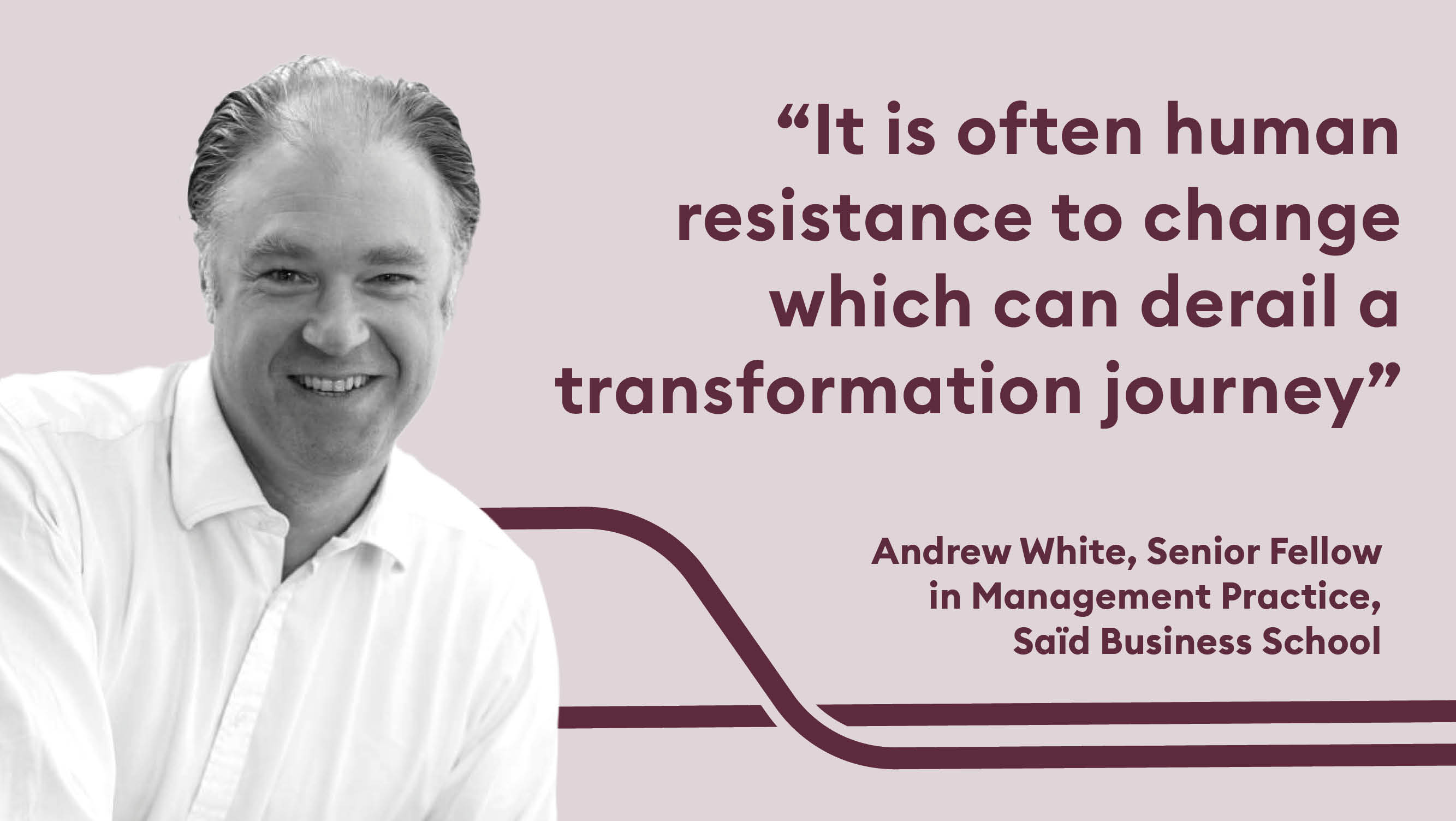In today’s disrupted world, the need for transformation has never been so ubiquitous. But even though more and more leaders are having to exercise their ‘transformation muscle’, success rates are not really improving.
To understand the skills, mindsets, and capabilities behind successful transformations in today’s dynamic environment, Saïd Business School partnered with EY to investigate what it takes to lead a successful transformation. We surveyed 935 leaders and 1,127 workers, and conducted in-depth interviews with leaders from multiple global companies, to identify critical turning points in their transformation journeys and what they did to affect those.
We had a hunch that there would be something significant relating to the human experience. It is often human resistance to change which can derail a transformation journey. More specifically, we wanted to unpick the emotional side of things, so we asked: ‘what are the emotions that people feel at the beginning, the middle and the end?’ – for both successful and unsuccessful transformation projects.
The role of leadership in transformation
The workforce ranks leadership as the top driver regardless of the success or failure of the transformation. We found that successful leaders combine three things: an acceptance of disruption; leading through listening rather than hierarchical power; and connecting their work to a purpose they care deeply about. This deep caring and listening to the emotional journey of people participating in the change makes all the difference.
Removing existential anxiety
When you embark on any kind of organisational change, one of the first questions that might come into workers’ minds is ‘will I have a job at the end of this?’. Sometimes when the word ‘transformation’ is mentioned, what people hear is ‘headcount reduction’. If that's the case, you've got to deal with that. But if that's not the case, leaders must make that very clear, to remove any existential anxiety.
Positively promoting reskilling and upskilling
The next question employees have is, ‘am I going to be asked to do a job that I'm not skilled to do? And am I going to be held to unrealistic expectations, or am I going to be allowed to learn and be helped through this transition?’
Understanding loss and potential for creativity
We all know that going through change requires an acceptance of loss and a pivot to being creative about the future. So helping individuals transition quickly from grieving the loss of the ‘old world’, to being creative about the ‘new world’ and its possibilities is a key skill for today’s leaders. Feeling safe and listened to is a fundamental requirement for employees to ensure that emotions accelerate, rather than hinder, the transformation efforts.
Creating psychological safety and providing support to learn
Creating an environment where all voices can be heard and people have the psychological safety and support to learn, practise and try new things is critical. Employees feeling as though they have the ‘disciplined freedom’ to create the future for their role in the organisation is an important phenomenon that leaders can either enable or inhibit.
Why learning is the future of work
We know that the skills needed to succeed at work are evolving fast and will continue to do so ever more rapidly.
At the heart of meeting this challenge is learning.
Without effective learning and development programmes, modern training methods and a culture that puts learning front and centre, reskilling and upskilling initiatives cannot succeed. Read our latest Whitepaper focussing on the Future of Learning.
Embed learning in your leadership development
Future Talent Learning can help employees develop the human skills needed to transition from managing to leading. We provide immersive learning experiences for busy professionals at all levels. Our courses focus on the most in-demand human-centred skills that can be applied and practised in the flow of work.
We offer a range of ready-to-go short courses and 100% virtual mini-MBA that delivers against two management apprenticeships, funded through your Apprenticeship Levy.
More about Andrew White
Andrew is a Senior Fellow in Management Practice and was previously the Associate Dean of External Relations (2020-2021) and Associate Dean for Executive Education and Corporate Relations (2010-2020) at Saïd Business School. He has directed and taught a wide range of executive development programmes for organisations such as BAE Systems, Lloyd’s Market Association, the Government of Abu Dhabi, Avon Cosmetics, State Farm and IBM.
Andrew acts as a consultant to a number of international organisations and has co-authored a review of how information technology will create intelligent infrastructure systems over the next few decades for the British Government's Department of Trade and Industry. He is a Fellow of the Royal Society for the Encouragement of Arts, Manufacturers and Commerce and is a Scholar with the Advanced Institute of Management Research.

















